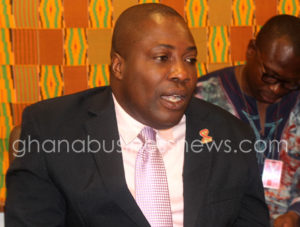[ad_1]

A political tug-of-war between Republicans and the Biden Administration over the funding cycle for the President’s Emergency Plan for AIDS Relief (PEPFAR) could threaten HIV efforts in countries where PEPFAR funding has been a lifeline, but impact on Ghana would be minimal.
The Republican leadership has opposed the five-year funding plan for PEPFAR, agreeing only to a one-year funding cycle, a situation seen as detrimental to HIV programmes in countries that depend on PEPFAR for support.
The argument the Republicans are making against the programme started by the Bush Administration in 2003, is that some of the organisations that benefit from PEPFAR, use some of the funds for abortion programmes.
But Dr. Stephen Ayisi-Addo, Programme Manager, National AIDS/STI Control Programme (NACP) has told Ghana Business News in an exclusive interview that the immediate impact on Ghana is minimal.
“The immediate impact is minimal because direct PEPFAR funding is small compared to the main Global Fund and UN system support. Ghana is just a technical assistant country for PEPFAR, unlike Nigeria and most East African countries. Indirectly, it will affect US contribution to the Global Fund and may create uncertainty. The combination of these will be a reduction in external funding for Ghana’s response to HIV,” he said.
Dr Ayisi-Addo stated that PEPFAR funding to Ghana has not increased significantly over the past three years, so a five-year reduction to one year will maintain the status quo with a potential to decline.
The US government has so far provided more than $110 billion in funding for PEPFAR. The PEPFAR funding is comprised of US bilateral funding and contributions to multilateral organizations addressing HIV, including for the Global Fund to Fight AIDS, Tuberculosis and Malaria.
US funding for PEPFAR grew from $1.9 billion in 2004 to $6.9 billion in 2023; the 2023 funding includes $4.8 billion provided for bilateral HIV efforts and $2.05 billion for multilateral efforts ($50 million for UNAIDS and $2.0 billion for the Global Fund). The President Biden had requested $6.8 billion for PEPFAR in 2024.
Since its inception 20 years ago, PEPFAR reports saving more than 25 million lives and is currently providing HIV prevention and treatment services to several millions.
Dr Kyeremeh Atuahene, the Director General of the Ghana AIDS Commission has been cited in a GNA report in April 2023 saying Ghana needs about $132 million to effectively fight new HIV infections to ensure its elimination by 2030.
According to him, currently, funds from donor partners such as PEPFAR, the Global Fund and UNAIDS amount to $45.2 million, leaving a funding deficit of more than $86 million.
Globally, approximately 39 million people are living with HIV, and tens of millions of people have died of AIDS-related causes since the beginning of the epidemic.
Dr Ayisi-Addo also said Ghana is already being pushed to look elsewhere and internally to increase domestic financing of the national response to HIV.
“Current arrangements with funding partners ensure a government co-financing scheme with a potential increase in proportion going forward. Funding landscape analysis is a major requirement in the current Global Fund grant to be implemented starting January 1, 2024. In the next three years, we will integrate some HIV interventions in the general health system to leverage other funding sources to the health sector. The AIDS fund has also been launched to raise domestic funds to fill the funding gaps. This requires more progress, though,” he said.
According to Dr Ayisi-Addo, recent estimates show a drop in new HIV infections in Ghana from 19,000 in 2021 to 16,000 in 2022.
Citing the HIV Sentinel survey, he said, it shows an increase in prevalence amongst the youth.
“Also, the recent Integrated bio-behavioural survey in Ghana shows a higher prevalence amongst men who have sex with men and transgender women. Increases in prevalence amongst key populations pose a risk to new HIV infections since they are the bridging population for transmission in the general population,” he added.
He pointed out further that the main factor for increasing new infections is lack of awareness due to unfunded prevention interventions, low treatment linkage and retention, low viral suppression coverage, and overall limited service coverage.
“Whether we like it or not, current global security challenges such as new pandemics and wars will cause a significant reduction in external funding as the US will redirect funding to those areas and limit the availability of resources to fund health. We must as a country be more proactive in mobilisation of domestic resources to complement the dwindling global inflows,” he said.
Dr Ayisi-Addo cautioned: “We risk not achieving the global UNAIDS aspirational 95-95-95 targets if the impasse persists due to the ripple effect of reduction in funding coupled with the slow government efforts towards HIV funding support and other competing national health priorities.”
As the wrangling in US politics continues, over the PEPFAR funding, could that potentially lead to a decline in HIV awareness and care programmes in countries that need the funding? And what would the future look like in the fight against HIV?
By Emmanuel K Dogbevi
Copyright ©2023 by NewsBridge Africa
All rights reserved. This article or any portion thereof may not be reproduced or used in any manner whatsoever without the express written permission of the publisher except for the use of brief quotations in reviews.
[ad_2]
Source link
